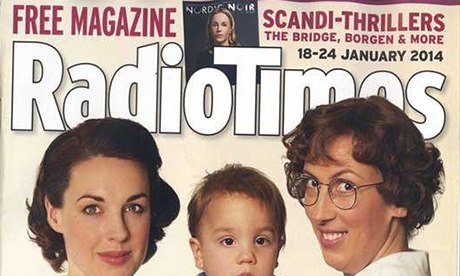
While other magazine publishers chase the digital-savvy generation of under-25s Radio Times is swimming against the tide somewhat, targeting a slightly older, thirtysomething demographic with its online products. But then the average age of its print readers is 57.
The weekly is the standout title in Immediate Media's 56-strong magazine portfolio, accounting for 60% of the company's total adjusted profits of £26.5m (up a quarter year-on-year), according to the most recent public financial report for the year to 31 March. "It is the jewel in the crown, a phenomenally robust brand that everyone knows and we can move that into digital services targeting the late 20s to 40s," says Tom Bureau, chief executive of Immediate Media. "We're not focusing on 16 to 24s, we think that's where social TV apps and those services are focusing their attention. We need to be laser-targeted."
The venerable listings title is touted as the most profitable magazine in the UK, and Bureau could choose to milk its impressively slow decline for years ("it is very robust, very few people leave the title, we're talking mortality"). Instead it epitomises the publisher's ambition to turn its print titles into multi-platform brands. Radio Times recently invested heavily in Discover TV, an iPad app (soon on iPhone and Android) targeting 30- to 35-year-olds with Buzzfeed-style "best of" recommendation lists. It costs £2.99 a month, but the company is also offering a cut-down level of access with a "freemium" version.
"It's a different audience and we don't think it will cannibalise the magazine," Bureau says. "It also offers advice on catch-up TV and video-on-demand, which traditional publishers have been slow to embrace." Significant work on the Radio Times website has also paid dividends ("we inherited a relatively poor web proposition"), with unique users up from about 1 million to 5 million in the 18 months since acquisition from the BBC. "We are profitable now, and will be quite substantially profitable this year," he says, adding that the aim is to build the website to 10 million unique users.
While good progress has been made in regards to digital innovation, the familiar problem faced by publishers – of digital pennies versus analogue pounds – remains unsolved. The company made total revenues, excluding joint ventures, of £150.7m in the 12 months to 31 March, a 3.3% year-on-year rise. However, digital revenues are estimated to be not even 5% of that.
With a focus on digital investment, a shift to larger offices in Hammersmith to accommodate the £121m acquisition of BBC magazines in 2011, and a drive to hire tech-savvy staff, the company made a £2.6m pre-tax loss for the year to the end of March. This strategy, reflected in 70 of 135 new starters last year (the company employs 850 staff) coming from a tech or digital background, is starting to pay dividends. Bureau says that digital revenues have doubled from £4m to £8m in the 18-month period to the end of 2013. And they will double again over the next two to three years. There have been 70,000 downloads of the Discover TV app since it launched in November, and about 70,000 of the 1 million subscribers across all of its titles are to digital products.
With 70 brands, 36 websites and 56 magazines, Bureau has to be selective about what to invest in, and what platforms work best for each product. "What to focus investment on is a perennial problem," he says. "It is brands that are becoming more and more important in a digital world."
A perhaps surprising multi-media winner has turned out to be BBC History magazine. The title has about 90,000 print and 15,000 digital subscriptions, split between the iPad and Amazon's Kindle e-reader. In the online-only department is the fledgling parent site Made For Mums, in part built out of the acquisition of Baby Expert from rival Hearst, which is aiming to make inroads into Mumsnet territory. Bureau is also harbouring big digital ambitions for a web spin-off of You & Your Wedding magazine, again another castaway by Hearst, tapping the multi-million-pound venue booking market with a "Rightmove for weddings" auction platform.
Immediate Media is owned by private equity firm Exponent, which also owns the digital media jobs service Gorkana and at one time owned the Times Educational Supplement. While private equity companies have been known to strip costs to boost short-term profitablity with an eye for a quick exit, Bureau is confident the strategy is healthy and sustainable. It has been over two years since the BBC titles were acquired and over seven since publishing group Magicalia, with which the corporation's magazines were merged, was bought.
He claims that adjusted profits, earnings before interest, tax, depreciation and amortisation, have grown by about a quarter since the corporation's titles were in the hands of BBC Worldwide. "We are investing heavily in content," he says. "The key thing about our positioning is we are talking about ourselves as a special interest and platform company. We are going beyond print. We want to get as good with mobile, web and digital subs as we are with magazines."

